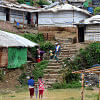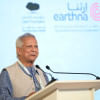Same old trick
Myanmar's promise to take back the Rohingyas, who fled to Bangladesh to escape a brutal military crackdown, looks hollow, as it is still showing an unbending attitude towards them.
Following a Myanmar union minister's Dhaka visit early this month, Naypyidaw announced that repatriation of the Rohingyas must be done on the basis of verification of the refugees in line with the criteria agreed to by the two countries in a joint statement in 1992.
Yesterday, it came up with a similar statement hours after Bangladesh's home minister concluded his Myanmar visit.
Naypyidaw made it clear that it doesn't want to take back all 600,000 Rohingyas, who have taken refuge in Bangladesh over the last two months.
"I am not sure how many people would be repatriated," said U Tin Myint, permanent secretary of Myanmar's Ministry of Home Affairs.
"But that would be carried out based on the national verification process of the immigration and population ministry," he said in the statement available on the official website of State Counsellor Aung San Suu Kyi.
If the 1992 agreement is followed, only around 14,000 Rohingyas may get the chance of repatriation, if at all. The reality is that more than six lakh Rohingyas have already arrived in Bangladesh since August 25.
The mention of the 1992 agreement is a tactic to buy time and avert international pressure.
The agreement was signed after an influx of more than 2.5 lakh fear-stricken Rohingyas who fled their country following a crackdown.
After prolonged discussions, Naypyidaw agreed that the Rohingyas having "Myanmar citizenship identity cards or national registration cards or other relevant documents" issued by the authorities concerned could return to Myanmar.
But since then, things have changed in Myanmar, making it impossible for Rohingyas to meet these criteria.
The Myanmar government began a citizenship verification process in 2014 under the draconian 1982 law which deprived Rohingyas of citizenship. It allowed temporary resident cardholders to apply for citizenship on condition that they are listed as Bangalees.
But in 2015, the temporary resident cards were also cancelled, denying Rohingyas voting rights in the 2015 elections that saw Suu Kyi's return to power. Later in June that year, Myanmar started issuing Identity Cards of National Verification.
As the Kofi Annan Commission set up by Suu Kyi this year reported that around 4,000 Rohingyas out of one million have been recognised as citizens or naturalised citizens. Around 10,000 more Rohingyas got national verification cards considered as a preparatory step towards citizenship.
Myanmar's proposal means it is unwilling to take back more than the 14,000 registered Rohingyas. And its intent not to take back all Rohingyas has been exposed through its home secretary's remark that "I am not sure how many people would be repatriated".
Naypyidaw's attitude also indicates that its strategy is designed to buy time as its home secretary said "Bangladesh wants to repatriate as soon as possible. But we will go step by step and form a joint working group for repatriation."
Myanmar is in no hurry even to form a joint working group. When its minister visited Dhaka, both sides agreed to form the joint working group. In yesterday's statement, Myanmar said the working group would be formed in November.
And this time, it came up with another devious tactic as it is now speaking about resettlement of Rohingyas whom they will take back. This indicates that Myanmar will not allow Rohingyas to return to their homeland in Rakhine State.
According to a report by Myanmar newspaper Irrawaddy, Myanmar home secretary said on Tuesday, "We are yet to rebuild infrastructure and draw up resettlement plans to accept them back."
When the Myanmar minister visited Dhaka early this month, there were around five lakh newly arrived Rohingyas in Bangladesh. But that number has now crossed six lakh.
Naypyidaw also doesn't believe in the UN statistics on Rohingyas crossing border into Bangladesh.
"There is a huge gap regarding the numbers of people who fled to Bangladesh between the ground survey of Rakhine State government and UN statistics," said the Irrawaddy report quoting the Myanmar president's office.
In yesterday's statement, Suu Kyi, de facto leader of Myanmar, was quoted that she expressed her firm conviction to resolve bilaterally all issues including repatriation of the Rohingyas in an amicable manner.
But the tactics of her government portrays the opposite.
In the statement, the Myanmar government, however, acknowledged a historic truth by saying the Rohingya families have lived in Myanmar for generations.
It further admitted that Rohingyas are denied citizenship and access to basic civil rights such as freedom of movement, decent education and healthcare.
These acknowledgements clearly show that the Myanmar state machinery has made things extremely difficult for the Rohingyas to live there as human beings.

 For all latest news, follow The Daily Star's Google News channel.
For all latest news, follow The Daily Star's Google News channel. 








Comments